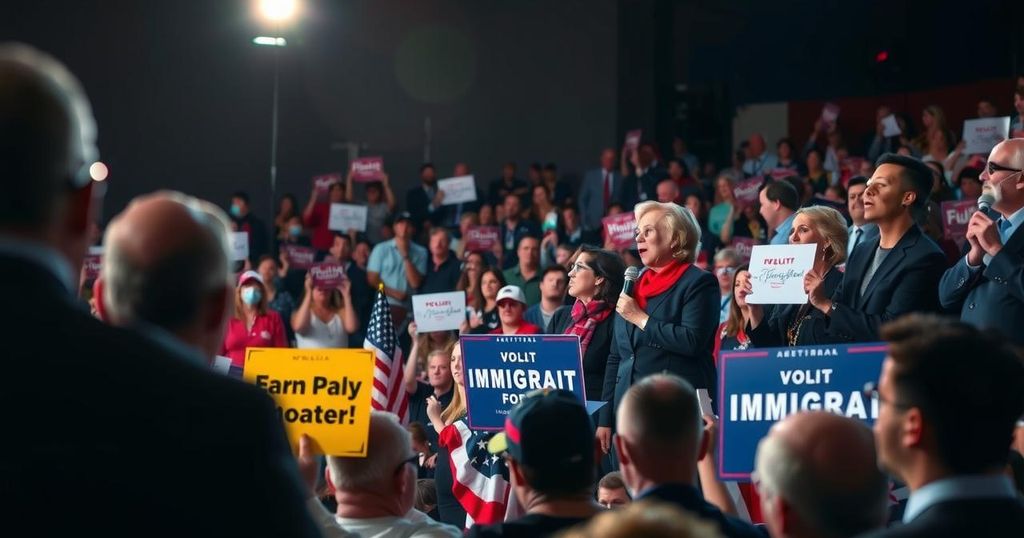US Presidential Candidates Embrace Increasingly Hardline Immigration Policies
The immigration debate in the U.S. has seen candidates from both major parties adopting more stringent policies, reflecting a global trend toward right-wing politics. Former President Trump has intensified anti-immigrant rhetoric, while Vice President Harris has also committed to harsher border controls. Experts note that this shift has mainstreamed extreme views and jeopardized asylum rights, paralleling similar movements in Europe. As fears around immigration grow, political strategies increasingly prioritize hardline measures, threatening the established principles of asylum for those fleeing conflict and hardship.
In recent months, the shift toward stringent immigration policies among U.S. presidential candidates has become increasingly pronounced, reflecting a wider global trend of rightward politics on this critical issue. Former President Donald Trump has consistently amplified rhetoric surrounding immigration, framing it as a threat to national security. During a recent rally in Aurora, Colorado, he pledged to execute the “largest deportation operation in the history of the United States,” asserting, “We will close the border… We will stop the invasion of illegals into our country.” In a similarly alarming address in Wisconsin, Trump made sensational claims about undocumented immigrants invading homes and committing violence. As the electoral competition intensifies between Trump and Vice President Kamala Harris, it has been observed by scholars that both major political parties are adopting more hardline stances on immigration. Harris, while representing the Democratic Party, has made pledges that go against the foundational tenets of asylum rights, declaring support for increased border enforcement and additional agents. Her campaign advertisements highlight her backing of the strictest border control legislation in decades, suggesting that Democrats are also yielding to pressure from the right. Experts, including Petra Molnar, a lawyer specializing in migration, contend that the increase in anti-immigrant rhetoric is no longer confined to the far-right fringes but is permeating mainstream political dialogue. Molnar indicates that the long-standing narrative of being “overrun by ‘the other'” is now prevalent across the political spectrum, complicating discussions about human rights and refugees. Historically, immigration has been a contentious subject in U.S. politics, evidenced by the rhetoric from Republican candidates like Pat Buchanan in the 1992 campaign, who decried immigrants as responsible for various societal issues. Yet today, such extreme views have transitioned into accepted political discourse, increasingly jeopardizing the principles of asylum for individuals fleeing hardship. This rightward shift is not unique to the U.S.; similar patterns are observable in Europe. For example, the British nativist Reform UK Party gained significant electoral support by advocating for immigration freezes. Likewise, parties such as the Alternative for Germany have made noteworthy electoral gains, suggesting a broader acceptance of anti-immigration sentiments across western democracies. Additionally, the French government is taking measures to adopt strict immigration policies, mirroring the rhetoric of far-right candidates. The growing appeal of populist parties and the rise of economic austerity appear to coalesce around immigration narrative, with scapegoating of immigrants becoming a common theme. Judith Sunderland from Human Rights Watch points out that mainstream parties are reacting to the far-right’s strength, leading to an overall hardening of attitudes regarding immigration policy. Amidst this climate, international asylum laws are being increasingly disregarded by several Western nations, with reports of temporary suspensions on asylum petitions. In the U.S., public sentiment around immigration remains significant, as evidenced by polling indicating it is among the top concerns for voters. President Biden has had to recalibrate his approach to immigration throughout his administration, adopting policies previously championed by Trump, including enforcement measures against asylum seekers. Following Biden’s surprising withdrawal from the 2024 race, Vice President Harris has retained these tough immigration policies while pledging to escalate enforcement against border crossings. Although there is a slight differentiation in their approaches, as Democrats advocate for expanded legal immigration pathways, they remain firmly positioned on the defensive against accusations of ineffective immigration control. This shift poses a significant challenge to maintaining discussions about the positive contributions of immigration and the moral responsibilities toward those seeking refuge from violence and persecution.
The contemporary immigration debate in the United States is increasingly defined by a politically charged atmosphere in which both major parties are gravitating toward stricter immigration measures. This trend mirrors similar movements in Europe, where far-right parties have gained traction, often by exploiting fears surrounding immigration. An understanding of the historical context reveals that immigration has consistently been a divisive issue in U.S. politics, with rhetoric often swaying toward sensationalism and alarmism. In light of a heightened atmosphere of concern regarding border security and the perception of immigrants as threats, political candidates are shaping their platforms to resonate with voter anxieties, leading to a significant shift in the dialogue surrounding immigration rights and policies.
In conclusion, the political landscape surrounding immigration has shifted dramatically as both Republican and Democratic candidates adopt increasingly stringent positions, effectively mainstreaming views that were once associated with fringe groups. The pervasive fear of immigration has been weaponized by candidates like Trump while prompting a defensive posture among Democrats such as Harris, illustrating a broad societal reluctance to engage in constructive discourse on the benefits of immigration and the obligations of nations toward displaced persons. This shift raises critical questions about the future of asylum rights and the moral impetus of international law in the context of rising populism.
Original Source: www.aljazeera.com




Post Comment